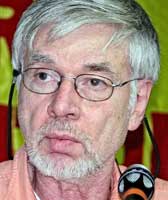Deep roots of WWP’s internationalism
By
John Catalinotto
Published Dec 6, 2008 8:15 PM
|
John Catalinotto
WW photo: G. Dunkel
|
Workers World Party’s history of international solidarity has its roots
in a time when, though we were the strongest defenders of the Soviet Union
against imperialism, we were isolated from the world communist movement
centered in Moscow. We were happy on the occasions our work was recognized, as
when North Vietnamese President Ho Chi Minh in 1963 recognized the role of
Youth Against War and Fascism [WWP’s youth organization] in initiating
demonstrations to get the U.S. out of Vietnam.
Our party chairperson Sam Marcy and the other leaders not only insisted that
the party youth put international solidarity in action, they set the example by
disrupting the United Nations in solidarity with Lumumba’s Congo in 1960.
We marched in Times Square to say “Hands off Cuba” in 1962, held a
public meeting to defend the Indonesian communists who were being slaughtered
in 1965, and were the only ones to picket at the U.N. to protest the June 1967
U.S.-Israeli war.
Whether these actions won recognition or temporarily isolated us, we learned
this was what we had to do if we wanted to think of ourselves as
revolutionaries.
Today, there is no single international center to the movement. The
workers’ movement is only beginning to recover from the disappearance of
the USSR. But the world economic crisis forces it to recover. Our party has
both the responsibility and the opportunity to play an important role, simply
because we are located in the center of world imperialism. What we do here is
magnified 100 times.
Proletarian internationalism is in our hearts. Only now our actions go over the
Internet to the world. How we wish we could have done that with Comrade Sam
Marcy’s writings.
This past year, for example, our WW articles have been sent all over the world.
Besides those we publish in English and Spanish, some are translated to Arabic,
French, Portuguese, Spanish and Russian, and sometimes Chinese, posted on
websites and read by communists and class-conscious workers.
We also actively fight against Washington’s war drive. Our record of
consistent anti-imperialist positions in the entire post-Soviet period has
established us as a reliable ally of all anti-imperialist and national
liberation struggles worldwide.
We participate in solidarity trips to Cuba to break the blockade, such as the
FIST trip last year or the Venceremos Brigade or the Pastors for Peace
campaigns. We take part in tribunals in Colombia against the state and the
transnational corporations, and the tribunal on Israeli War Crimes in Lebanon.
We help organize the Tijuana labor conference that takes place each
December.
Some of the recent international conferences we’ve had delegations at are
mainly for discussion and exchange of ideas—this year in Mexico City at
the Workers Party meeting, in Havana for the Marxism discussion, the recent
gathering of Artists and Intellectuals in Defense of Humanity in Caracas, among
others.
To promote joint actions, we have recently participated in the meeting of the
International League of Peoples Struggle in Hong Kong, and also of an allied
movement of migrant workers, and we helped set up the International
Anti-Imperialist Peoples Struggle Coordinating Committee at a meeting in
Kolkata, West Bengal, last December. In January, this group will be part of a
larger forum in Beirut that should represent the interests of the resistance
movements of the Middle East and anti-imperialist forces elsewhere.
We could not expect a new international to exist without a new revolutionary
upsurge. Yet these organizations can create a framework for solidarity in
struggle.
The transnational corporations have organized production internationally. The
imperialist ruling class has the IMF and NATO to oversee its interests. The
workers and oppressed deserve their own international coordination.
The party can only earn its revolutionary reputation by fighting the class and
national struggle here at home, but it will do it with organizers who have
trained their brain and muscle, by habit and by understanding, with an
internationalism that makes no move without considering the interests of the
most oppressed of the world.
Articles copyright 1995-2012 Workers World.
Verbatim copying and distribution of this entire article is permitted in any medium without royalty provided this notice is preserved.
Workers World, 55 W. 17 St., NY, NY 10011
Email:
[email protected]
Subscribe
[email protected]
Support independent news
DONATE


